 |
| Ane Mulligan |
Contrary to popular belief, backstory is a good thing. Now,
before y'all call for a lynching party, let me tell you what it's good for and what it's not good for. After all, backstory helps you, the author know your
character. What makes her tick? What formed her worldview? Why does he dislike
women who have a good business head?
Let's get the "not" out of the way first. The
reader does not need to know the
backstory of your characters to understand the plot—at least not in the
beginning. A bit of mystery about the character is a good thing. It draws the
reader onward to find out why this otherwise nice guy is so antagonistic to the
heroine.
I always tell new writers to think of it this way. You're
attending a party, and your host introduces you to a new neighbor. You start
off the conversation by telling her your life history, and the new neighbor
will be in jeopardy of whiplash, looking for the host—or anyone for that
matter—to rescue her.
Readers who are bombarded with backstory in the first few
chapters of a novel with either skip over it or close the book for good. Either
way, putting it in wasted your time.
Now, let's look at what backstory is good for and how to discover it. First, I
conduct a character interview (CI). Think of that as a journalist interviewing
a subject for an article. In my CI, I dig and prod for the character's secrets
and for his or her fears. What happened in their childhood that had a major
effect on them?
After I've completed the CI, I write a stream of
consciousness (SOC) backstory. This is where I go back two or more generations.
People are the product of their ancestors' worldview. For example, let's say
your great grandparents lived through the Great Depression. They probably could
get more for a quarter than anyone you know. They taught your grandparents, who
taught your parents. But did your parents continue that trait or did they,
because of their more affluent status, break away from it?
It's within the SOC backstory where I discover so much about
my character. Besides their worldview, I learn the lie they believe about
themselves, and that lie will color their motivation, and that motivation will
drive their plotline.
Your characters will either fall victim to their lie or they
will try to prove it wrong. Remember, the key is: Lie drives motivation drives
plotline.
Much of what I learn never makes it into the manuscript, but
if makes the characters come alive. They're three-dimensional and when they are
real to you, the author, they become real to the reader.
One of my beta readers said after reading Chapel Springs Revival, "I love these
people. I want to find out more about their lives."
And that's the goal for back story.
About the author:
Ane Mulligan writes Southern-fried
fiction served with a tall, sweet iced tea. Her debut book, Chapel Springs Revival, is due out in
2014. She's a novelist, a humor columnist, and
a multi-published playwright. She resides in Suwanee,
GA, with her artist husband, their chef son, and two very large dogs. You can find Ane on her website, Facebook, Twitter, or Pinterest.
Chapel Springs Revival:
With a friend like
Claire, you need a gurney, a mop, and a guardian angel.
Everybody in the small town of Chapel Springs, Georgia,
knows best friends Claire and Patsy. It's impossible not to, what with Claire's
zany antics and Patsy's self-appointed mission to keep her friend out of
trouble. And trouble abounds. Chapel Springs has grown dilapidated and the
tourist trade has slackened. With their livelihoods threatened, they join
forces to revitalize the town. No one could have guessed the real issue needing
restoration is personal.
With their marriages in as much disarray as the town, Claire
and Patsy embark on a mission of mishaps and miscommunication, determined to
restore warmth to Chapel Springs —and their lives. That is if they can convince
their husbands and the town council, led by two curmudgeons who would prefer to
see Chapel Springs left in the fifties and closed to traffic.


Interviewing the characters or at least having a conversation with them really helps. Thanks Ane.
ReplyDeleteWelcome, Ane! I'm so excited about your visit to Write Right!, and I love your post.
ReplyDelete"I love these people. I want to find out more about their lives." Perfect! Half the batte already won! :)
Thanks Linda, and Sandy: it really does help!
ReplyDeleteDelia, thank you for the opportunity. :)
Ane, Delia pinpointed it... thanks for a great post.
ReplyDeleteGreat Post! Knowing my characters is what helps me write the story. It's the character interview before even an inkling of plot!
ReplyDeleteI agree back story is important. Your suggestion of getting to know someone. When we meet, we know nothing. Facts come to us a little at a time usually thru what others say, what we observe from them, or hear-say.
ReplyDeleteLoRee, Marian and Janet, y'all are racking up points! I love it! Thank you for following my tour and making me feel so welcome.
ReplyDelete